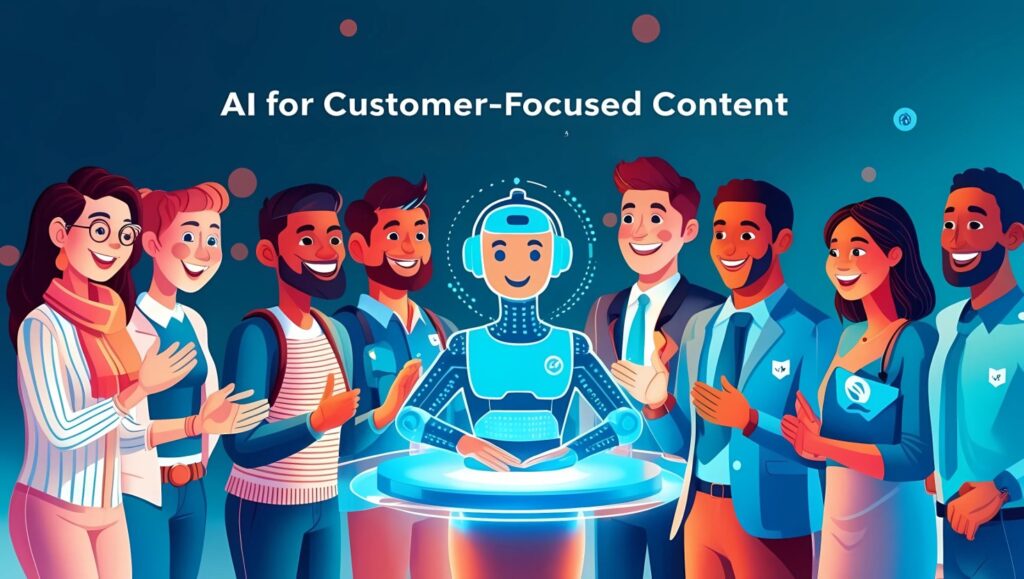Creating Detailed FAQ and Knowledge Base Articles with AI
Creating detailed and accurate FAQ pages, support articles, and knowledge base content is essential for delivering a seamless customer experience. However, crafting these resources manually can be time-consuming, inconsistent, and resource-intensive. Enter AI-powered tools, which streamline the process of creating personalised, high-quality content for customers.
By automating the creation, updating, and scaling of these resources, AI ensures that businesses can provide timely, relevant, and helpful information to their customers at all times. In this blog, we’ll explore how AI can revolutionise the creation of FAQs and knowledge base articles.
The Challenge: Creating Detailed and Accurate FAQs & Support Articles
Creating comprehensive, up-to-date FAQs, support articles, and knowledge base content is an ongoing challenge for businesses. The primary goal is to provide accurate, relevant, and easily accessible information to customers, but this can be difficult when content creation is left to manual processes.
1. Time-Consuming Manual Effort
One of the biggest hurdles in creating quality support content is the time investment. Writing, updating, and refining articles for common customer queries often requires significant human effort, especially for businesses offering a large number of products or services. Each change in product features or customer feedback necessitates a corresponding update in the knowledge base, which can be slow and cumbersome.
Example: A software company needs to constantly update troubleshooting guides to account for new versions and customer-reported issues, a process that requires a dedicated team and can take weeks.
2. Inconsistency in Quality and Tone
Another challenge is maintaining consistency in both the quality of content and the brand tone across all articles. Different writers, even within the same organisation, might interpret customer queries differently, leading to inconsistencies in style, voice, and even accuracy. This inconsistency can confuse customers and detract from their experience.
Example: One article might explain a solution in simple terms, while another might use more technical jargon, leaving customers frustrated by the variation in quality.
3. Scaling Content Creation
As businesses grow, so does the demand for new content. Scaling the creation of detailed, helpful FAQs and support articles can become overwhelming, particularly if the company is expanding to new regions or adding new features. Without a scalable solution, it’s easy to fall behind in creating or updating content, leaving customers with outdated information.
Example: A global e-commerce platform needs to create region-specific FAQs, which requires localisation and detailed translations. This process can be slow and inconsistent if done manually.
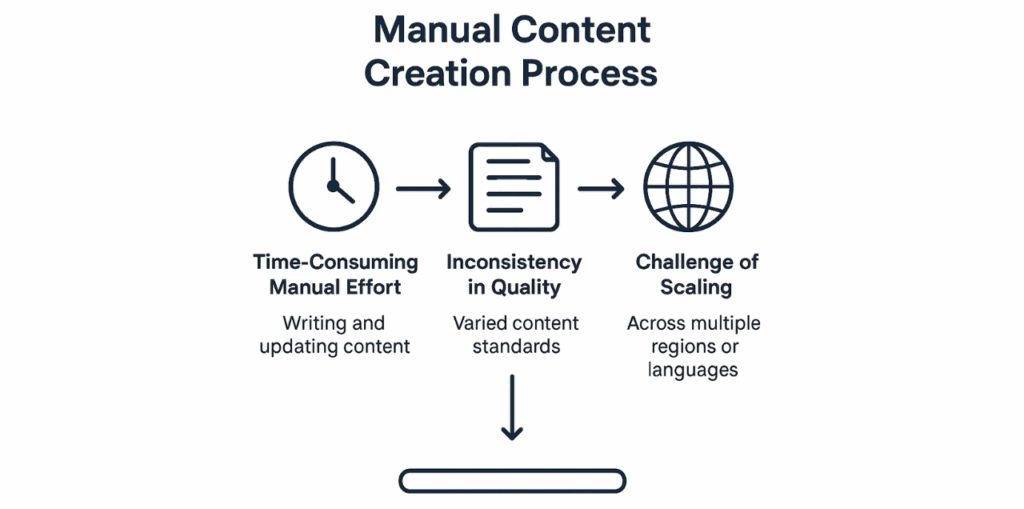
How AI Can Improve FAQ and Knowledge Base Content Creation
AI-driven tools offer significant advantages in creating detailed, accurate, and up-to-date FAQs and support articles. By automating the content creation process, AI ensures that businesses can efficiently generate high-quality content that resonates with customers and addresses their needs. Here’s how AI enhances FAQ and knowledge base article creation:
1. Automated Content Generation
AI tools, particularly Natural Language Processing (NLP) and Machine Learning (ML), can process large volumes of data from customer interactions, support tickets, and product updates to automatically generate comprehensive answers to frequently asked questions. AI doesn’t just provide text-based translations; it understands context, tone, and customer intent, ensuring that each response is relevant and useful.
Example: AI can generate content for troubleshooting guides by analysing common issues reported by customers, then automatically creating structured, helpful responses with step-by-step instructions.
2. Real-Time Updates and Scalability
AI systems can be continuously updated in real time, meaning that as soon as new issues, features, or product updates arise, AI tools can generate and publish new articles or update existing ones. This scalability ensures that support content remains relevant, timely, and helpful as businesses expand and evolve.
Example: When a software company releases a new update, AI can automatically create a new FAQ article and update existing ones based on the updated features.
3. Consistent Tone and Brand Voice
AI tools are trained to maintain a consistent tone and style, ensuring that all FAQs and support articles align with the brand’s voice. By leveraging deep learning, AI systems can produce content that mirrors the established communication style of the company, which can be particularly important for maintaining a professional and cohesive customer experience.
Example: If a company has a formal tone in its email responses, AI ensures that the same tone is carried through in its FAQs and support articles, maintaining consistency.
4. Personalisation and Contextual Relevance
AI can personalise FAQ and knowledge base content based on customer profiles, behaviours, and preferences. For instance, AI can recommend specific help articles based on the customer’s interaction history or the type of product they’re using.
Example: A customer who frequently browses a particular category on an e-commerce platform might automatically receive recommendations for relevant knowledge base articles tailored to that category.
5. Enhanced Search Functionality
AI enhances the searchability of knowledge base content. By understanding natural language queries, AI tools can match customers’ search terms with the most relevant articles, improving the overall user experience.
Example: If a customer types a complex question into the knowledge base search bar, AI can accurately interpret the query and provide the most relevant results.
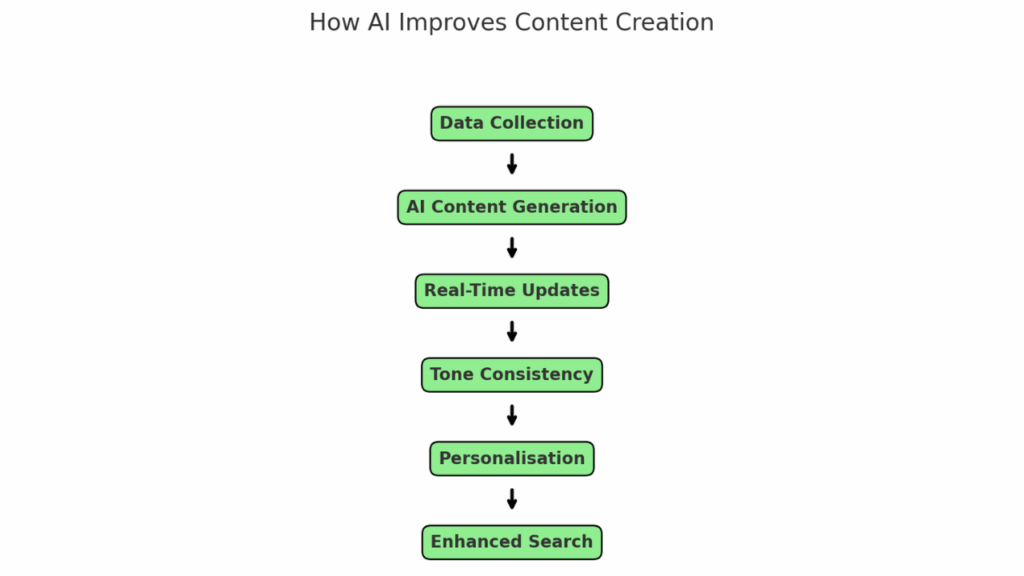
The Framework: How AI Creates Detailed FAQs and Knowledge Base Articles
AI-driven tools are transforming how businesses create, manage, and update FAQs and knowledge base content. By automating the process, AI ensures that businesses can scale and maintain high-quality, accurate, and relevant content across multiple platforms. Below is a framework for how AI-powered systems generate detailed and effective customer-facing support articles.
1. Data Collection and Analysis
AI begins by gathering customer queries, support tickets, and product usage data to understand the common issues customers face. This data is essential to ensure that AI-generated content is relevant to the most frequently asked questions and up-to-date with the latest customer concerns.
Example: If customers frequently ask about troubleshooting a specific product, the AI system will collect these queries and use them to generate a detailed support article.
2. AI Content Generation
Once the data is collected, the AI system uses Natural Language Processing (NLP) to create content. It generates a comprehensive FAQ or knowledge base article by:
- Understanding context: AI identifies patterns and context from previous customer interactions.
- Drafting content: It creates detailed, step-by-step guides or short responses based on common customer questions, ensuring the tone and language align with the brand’s voice.
- Example: The AI can automatically generate articles such as “How to set up your new device” or “Troubleshooting connectivity issues” based on patterns from customer support tickets.
3. Content Review and Refinement
After content is generated, it undergoes a review process where human oversight ensures accuracy and alignment with the brand’s tone. AI tools can assist in this process by flagging content that doesn’t fit the brand’s style or tone, allowing human reviewers to make final adjustments.
Example: If the AI creates a technical explanation that’s too complex, human reviewers can simplify the language while retaining the technical accuracy.
4. Real-Time Updates
AI tools are equipped to update content dynamically. As new product features are released or customer issues evolve, AI can modify existing FAQs and knowledge base articles. This ensures that the content remains relevant and helpful without requiring manual intervention.
Example: As a software company releases new updates, the AI tool automatically updates the knowledge base with new troubleshooting steps or instructions.
5. Multi-Channel Distribution
Once the content is created and updated, AI tools help distribute it across multiple channels, whether on the website, within mobile apps, or integrated into automated customer service chatbots. AI ensures that the content is always accessible and up-to-date across all platforms.
Example: A customer looking for support via a mobile app will receive relevant, up-to-date help articles powered by AI, offering them the most accurate and useful information.
Real-World Applications: How Brands Use AI for Knowledge Base Creation
AI-driven content creation is transforming how businesses approach customer-facing content, from FAQs to knowledge base articles. By automating and optimising the process, AI not only saves time but also ensures that content is accurate, scalable, and personalised to meet customer needs. Below are examples of brands using AI for knowledge base creation.
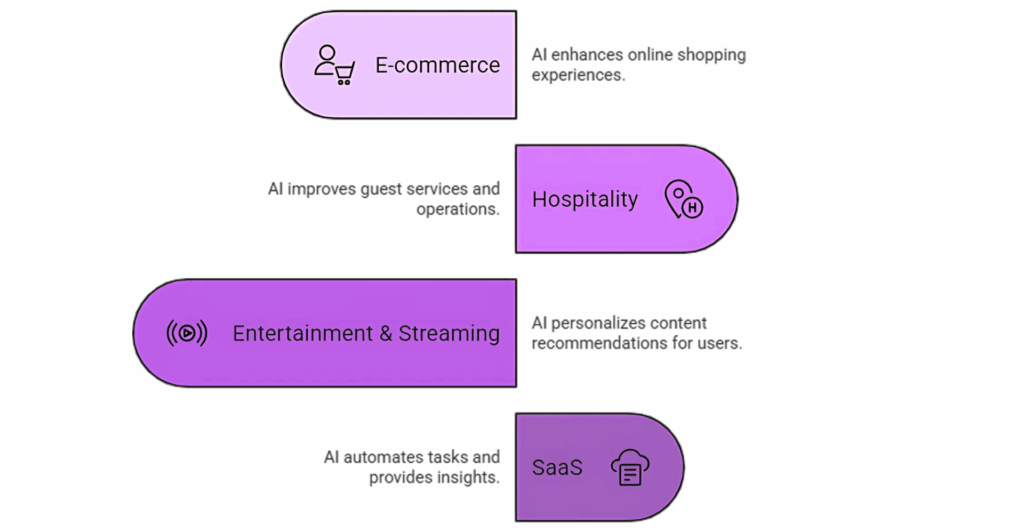
E-commerce: Scaling Product Support
E-commerce businesses face the challenge of creating a knowledge base of content for hundreds, if not thousands, of products. With AI, they can scale the creation of product support content, shipping information, and troubleshooting guides across various platforms (websites, mobile apps, customer service chatbots).
Example: Shopify, an e-commerce platform, uses AI to automatically generate product FAQs and troubleshooting guides based on customer feedback and support requests. The AI helps create new articles when product issues or customer questions arise, ensuring the content stays up-to-date.
Hospitality: Personalised Customer Support
In the hospitality industry, AI-powered content creation allows brands to provide region-specific information in their FAQs and knowledge base articles. From booking issues to location-specific guidelines, AI helps ensure that support content is relevant to each guest’s experience.
Example: Marriott Hotels uses AI to generate personalised check-in instructions, travel recommendations, and facility usage FAQs based on the guest’s preferences and booking details. This has resulted in a more seamless guest experience and increased customer satisfaction.
Entertainment & Streaming: On-Demand Help
For streaming platforms, AI-powered knowledge bases are vital for ensuring users can easily find help when issues arise, whether related to account access, streaming errors, or device compatibility. AI allows these platforms to keep their support content relevant as new devices and features emerge.
Example: Netflix uses AI to automate and personalise troubleshooting guides for account and streaming issues. By analysing user complaints and error logs, the AI creates targeted content, helping users resolve problems faster. The platform’s ability to dynamically update help articles contributes to increased user engagement and fewer customer service inquiries.
SaaS: Scaling Customer Support Documentation
For SaaS (Software-as-a-Service) companies, a comprehensive and accurate knowledge base is essential for customer retention. AI is used to automatically generate and update user guides, product documentation, and how-to articles, enabling SaaS providers to scale their customer support.
Example: Zendesk uses AI to power its knowledge base, creating detailed support content for users with little manual intervention. As new features are added to the platform, AI continuously updates the FAQs and troubleshooting content, allowing Zendesk’s support team to focus on more complex customer inquiries.
Key Benefits of AI for FAQ and Knowledge Base Content
AI-powered tools are revolutionising the way businesses approach customer-facing content, from FAQs to knowledge base articles. By automating the creation, updating, and distribution of this content, AI offers several key benefits that enhance efficiency, accuracy, and customer satisfaction.
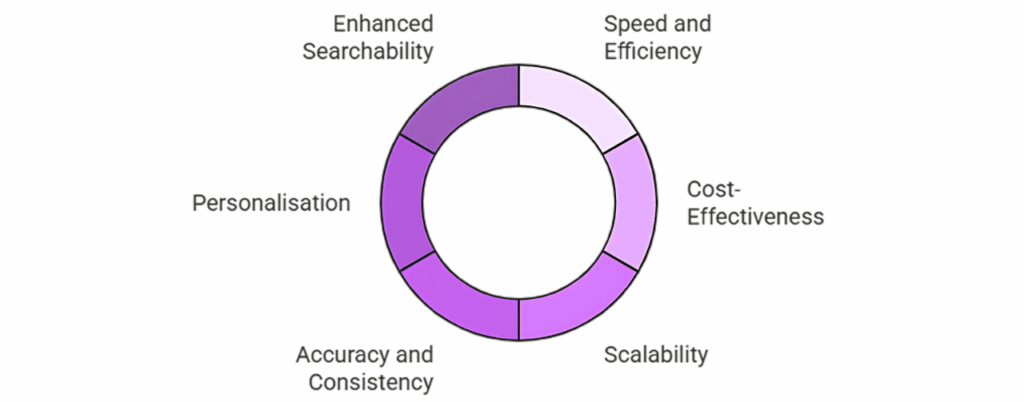
1. Speed and Efficiency
AI can generate high-quality content at a much faster pace compared to traditional manual methods. By processing data from customer interactions, AI tools can automatically draft and update support articles, eliminating the need for hours of human work. This ensures that businesses can respond quickly to emerging customer needs, updating FAQs and knowledge bases in real time.
Example: An e-commerce platform that regularly updates its knowledge base based on seasonal changes, AI can ensure these updates are made swiftly and consistently, reducing the time spent by support teams.
2. Cost-Effectiveness
Traditional content creation requires human resources for writing, reviewing, and maintaining FAQs and articles. AI dramatically reduces these costs by automating much of the process. Companies can leverage AI tools to scale content production without needing to hire large teams of writers or spend significant amounts on external content creation services.
Example: A SaaS company using AI to create and maintain detailed product documentation sees a 30% reduction in content creation costs, allowing more budget to be allocated to other customer service initiatives.
3. Scalability
As businesses expand, so does the need for scalable support content. AI allows businesses to scale their content creation to accommodate an increasing number of products, services, or global customers. AI tools can easily handle a large volume of FAQs and knowledge base articles across different regions and languages, all while ensuring that the content remains consistent and accurate.
Example: A global brand can use AI to create region-specific content for its knowledge base, ensuring that local customer queries are addressed while keeping the core content the same across all regions.
4. Accuracy and Consistency
AI tools use advanced algorithms and machine learning to ensure that all generated content is accurate and consistent in tone and messaging. AI models can continuously learn from customer interactions, improving the relevance of the content over time. This ensures that FAQs and knowledge base articles are not only accurate but also reflect the most up-to-date information.
Example: A software company uses AI to ensure that its support articles stay in sync with the latest software updates, ensuring that customers always have access to the most current troubleshooting information.
5. Personalisation
AI can personalise FAQ and knowledge base content based on customer profiles, behaviours, and search histories. By analysing past customer interactions and feedback, AI can deliver more tailored, relevant content to users, increasing the likelihood of resolving their queries without further assistance.
Example: AI can recommend specific help articles or guides to users based on their browsing history, ensuring that they’re presented with the most relevant content.
6. Enhanced Searchability
AI enhances the search functionality of knowledge bases by enabling natural language searches. Customers can search for help articles in the form of conversational queries, and AI will interpret these searches to find the most relevant content, improving the overall customer experience.
Example: A customer searching for a solution to a problem in simple terms will receive relevant, accurate results, even if their query isn’t phrased perfectly.
Critical Considerations When Using AI for Knowledge Base Content
While AI offers a wealth of benefits in creating and maintaining FAQs and knowledge base articles, businesses must take several critical considerations into account to ensure the system works efficiently and delivers accurate, helpful content. Here are the key factors to keep in mind when integrating AI for knowledge base content creation:
1. Human Oversight and Quality Control
While AI can generate content quickly, human oversight is essential to maintain high standards of quality. AI-powered tools may still make mistakes, especially when handling complex queries or nuanced topics. Therefore, it’s crucial to have a review process where human editors check AI-generated content for accuracy, tone, and clarity.
Action Point: Implement a two-step process: AI generates content, and a human reviewer ensures quality and tone before publication.
2. Cultural Sensitivity and Regional Customisation
AI translation tools are excellent for handling multiple languages, but businesses must ensure that their AI-generated content is culturally appropriate for the target audience. Cultural differences can affect how content is received, and AI tools must be able to account for these differences to avoid misunderstandings or misinterpretations.
Action Point: Use regional customisation features in AI tools to adapt the content for specific cultures, ensuring the message resonates with local audiences.
3. Continuous Feedback and AI Model Improvement
AI models are self-learning, but they need ongoing feedback to improve. As customer queries evolve and new issues emerge, it’s essential that the AI system be regularly updated with fresh data. Businesses should track customer feedback and engagement with FAQs to refine and enhance AI-generated content over time.
Action Point: Create a feedback loop where users can report inaccuracies or outdated content, enabling the AI system to learn from real-world customer interactions.
4. Data Privacy and Security
When using AI to collect and process customer data to generate content, businesses must ensure they are in compliance with data privacy laws like GDPR and CCPA. Customer data should be anonymised and handled securely, especially if AI tools use sensitive data to create personalised content.
Action Point: Ensure that your AI tools adhere to data privacy regulations and maintain the highest standards of data security to protect customer information.
5. Scalability and Platform Integration
AI-generated content should not only be accurate but also scalable to accommodate future growth. As a company expands, so too does the need for additional content, including FAQs for new products, features, or services. AI tools must be able to scale with the business and integrate seamlessly with content management systems (CMS) and customer support platforms.
Action Point: Choose AI tools that are capable of scaling and integrating with other systems to manage and distribute content efficiently.
Conclusion: The Future of AI in Customer-Focused Content Creation
AI is revolutionising the way businesses create and manage customer-facing content, from FAQs to knowledge base articles. By automating content generation, updates, and scalability, AI helps brands deliver timely, accurate, and personalised support to their customers. As AI tools continue to improve, they will become even more integral to customer-centric content strategies, making it easier for businesses to stay ahead of customer needs.
Ready to enhance your customer support with AI? Start creating detailed, scalable, and personalised content that meets your customers’ needs. Get in touch with us.
